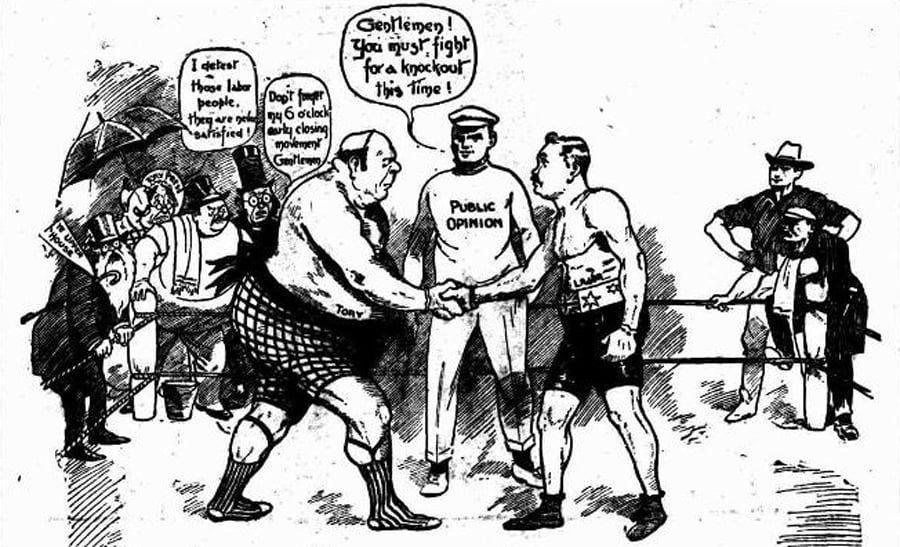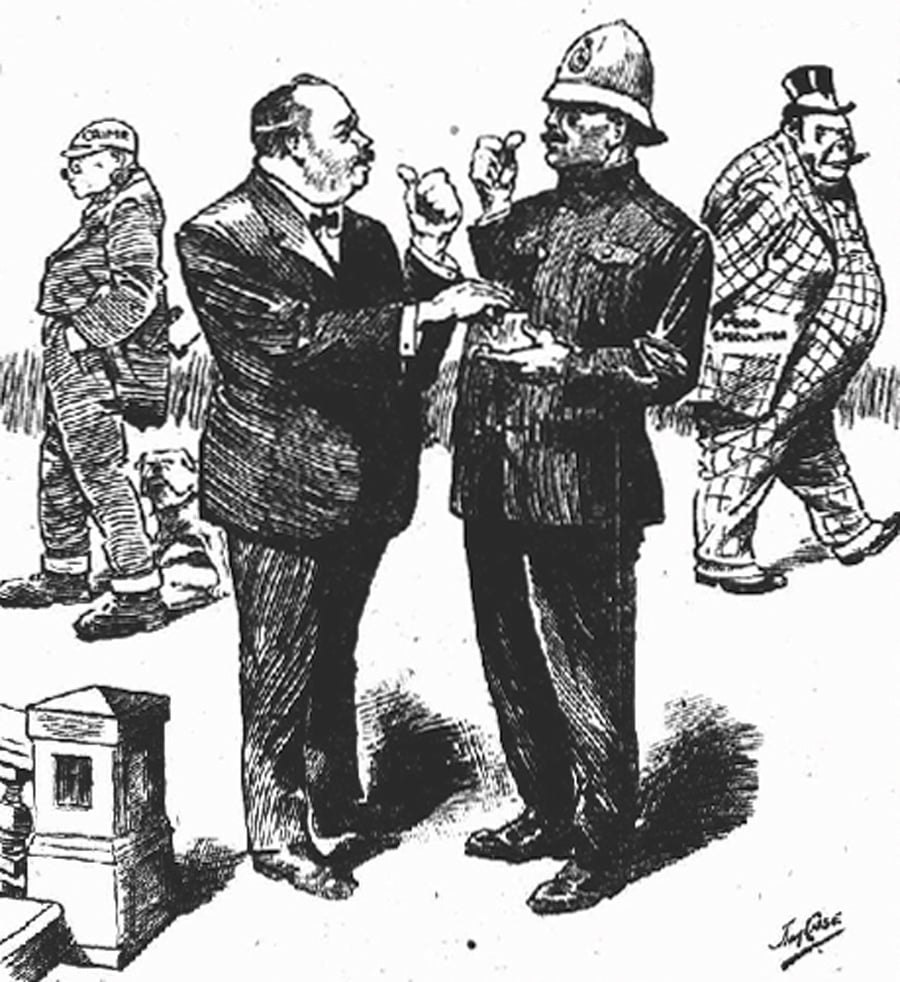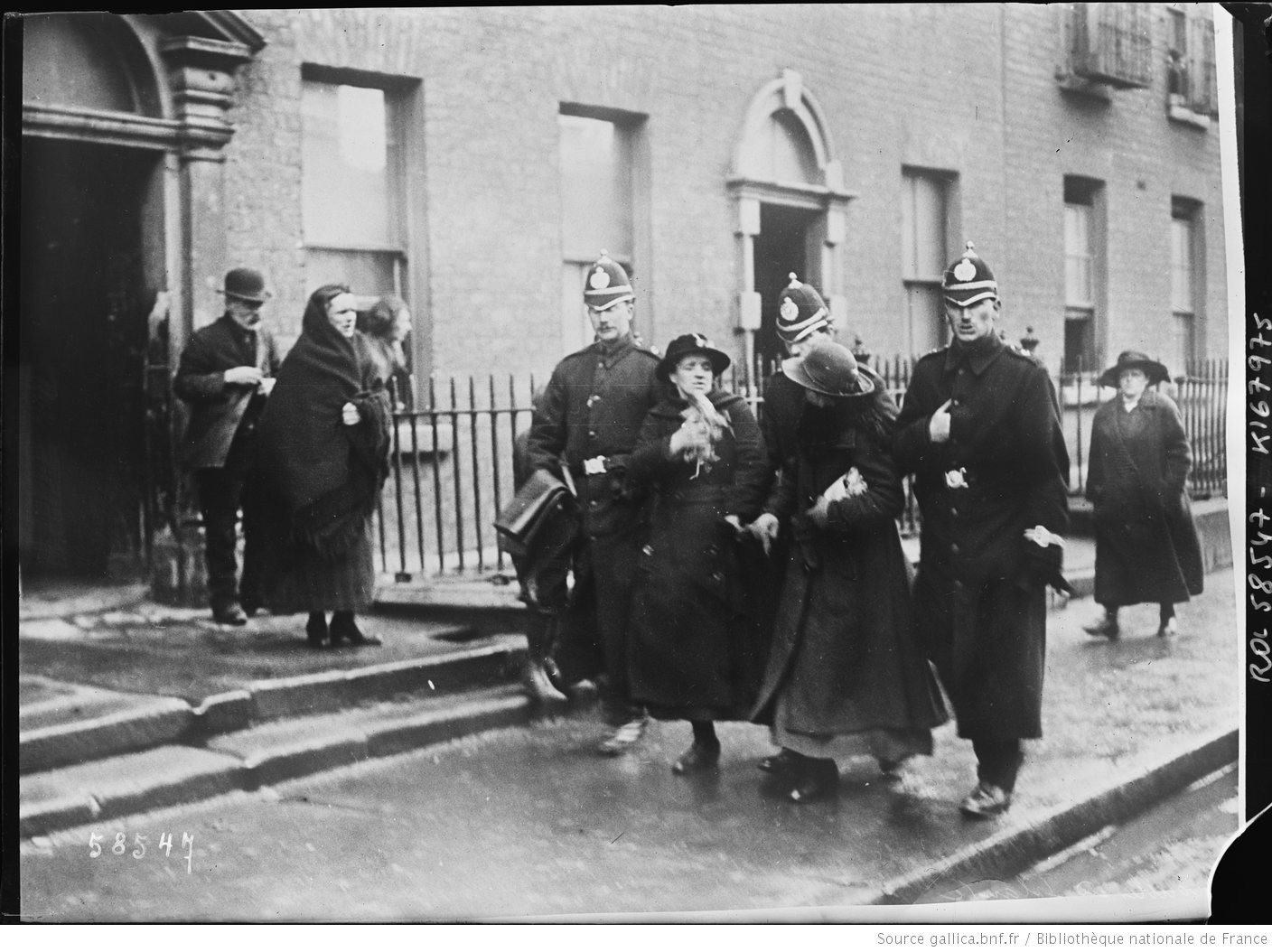The Dublin Metropolitan Police & the colonial legacies of Irish policing
By Anastasia Dukova
The Irish Revolution (1916 -1923) precipitated the emigration of many members of the Dublin Metropolitan Police and the Royal Irish Constabulary, which benefitted police forces of the newly federated Australian states.
Across the Empire, the colonial police had a complex role in controlling crime, through prevention and detection within metropolitan areas of the colony, and through force and intimidation on the frontiers.
As migration figures for the nineteenth century show, British colonies experienced an extensive influx of migrants from Ireland. Given that the Irish were a major source of recruits for the colonial police forces, the degree of resemblance between the mainstream colonial forces and the policing institutions of Ireland is not surprising. A significant proportion of Irish migrants, many with previous experience in law enforcement, brought their knowledge and skills with them, enabling the process of organisational knowledge transfer between the forces at home and abroad.
But just how far reaching was the Irish legacy?
In Australia, the colonial police forces of Queensland and Victoria displayed a strong Irish presence among both rank and file and commissioned officers.
In Queensland, between 1860 and 1920, Irish-born recruits substantially outnumbered other overseas-born recruits, peaking at 61% in the 1880s.
Ex-policemen and ex-military personnel were preferred applicants to the colonial police. This trend continued into the twentieth century. The 1910s saw an increase in the number of recruits into the Queensland Police Force, a quarter of them were Irish-born, and 70 out of 245 recruits listed ‘Policeman’ or ‘Royal Irish Constabulary’ as their previous calling. Constable Patrick Joseph Devine, from Skeaghvasteen, Co. Kilkenny, joined the Royal Irish Constabulary in 1908.
His RIC service was brief, with one posting in Brawney, Athlone, Co. Westmeath, before resigning to emigrate to Brisbane, Australia in 1913. The Register of Members of the Queensland Police shows that the majority of applicants identified as Roman Catholics. The Queensland Police would gradually come to be regarded as a bastion of Irish Catholicism, its Criminal Investigation Branch popularly becoming known as ‘the Vatican’.
Irish convicts and settlers, meanwhile, were systematically accused of disloyalty in the Australian colonies. A decade before the 1798 Rebellion in Dublin, in 1788, the First Fleet of 11 convict ships arrived in Sydney Cove, New South Wales.
In The Australian People, James Jupp estimated Lancashire and Dublin courts to have been responsible for 12% of arrivals between 1787 and 1852.
The United Irishmen Rebellion, the Fenian Rising, agrarian agitation, and the assassinations by the Invincibles, were all successively followed by spikes in accusations of treachery.
The outbreak of the First World War led to the suspension of the Home Rule Bill (the Government of Ireland Act 1914), and reinvigorated the nationalist fight for an Irish Republic. Allegations of partisanship against the Irish-born soon followed, spiking at the time of the Conscription referenda in 1916-17, which coincided with the Easter Rising in Dublin. Frank Anstey, an English-born Labour parliamentarian, and an ally to Australian Prime Minister William Morris ‘Billy’ Hughes, remarked: ‘before that date the Irish were as War mad as the English but the Easter Week stirred the Paddy.’
Soon the anti-war and anti-conscription rhetoric merged with anti-Irish, and finally anti-police, feeling.
In Warwick, Queensland, an egg thrown from the crowd at Billy Hughes, and an ensuing ‘under-reaction’ by the local police, led to calls for the establishment of a Commonwealth Police ‘uncontaminated’ by Sinn Féin sympathies. Hughes condemned the local police as ‘disgraceful, disobedient, and partisan’.
As Queensland voted ‘No’ by a small margin in the conscription referendum of 1917, he would openly blame Irish Catholics for the failure. Declaring Queensland to be in ‘latent rebellion’, he referred to the police as being ‘honeycombed with Sinn Feiners and I.W.W. [Industrial Workers of the World]’.
On 22 November 1917, the Queensland Legislative Assembly debated military censorship and its impact on conscription debates. Queensland Premier Thomas J Ryan, who was born to Irish immigrant parents, farmers Timothy and Jane Ryan, moved that ‘this House emphatically protests against the manner in which the censorship is being abused to suppress reports of the views of those opposing the Commonwealth Government’s conscription proposals, and condemns it as an unwarrantable interference with the rights of free discussion on the platform, and in the Press, upon the gravest issues ever submitted to the public…’ Despite the fact that Parliamentary records are subject to public distribution, the Military Censor did not deem these proceedings fit for public circulation and denied their transmission.

‘The political battle begins: Hughes vs. Ryan’ (Image: Truth, Sunday 20 August 1916)
Late at night on 26 November, the military authorities raided the Queensland Government Printing Office and seized thousands of copies of these parliamentary proceedings, also referred to as Hansard 37. Following the raid, from 2pm on 27 November to 11.15am on 29 November 1917, two non-Commissioned officers (NCOs) and five to six constables were posted on round-the-clock duty at the Government Printing Office.
On the night of 28 November, the Military Authorities once again assembled at the back gate leading to the Government Printing Office, Brisbane. Captain Stephens demanded to go into the Office.
Acting Sergeant Thomas Claire (Reg No 135), however, responded
that he could not let him in. Coincidentally, Acting Sergeant
Claire was Irish, and had joined the police in 1885.
This further fuelled Hughes’ convictions, as the Warwick
eggers - Paddy and Bart Brosnan - were the Australian-born sons of
Bart Brosnan from Co. Kerry. In the fallout, Prime Minister Hughes
accused the local premier, and the police, of anti-conscription
sentiment and disloyalty. In defence of the attempted censorship
of Hansard, Hughes compared Ryan’s parliamentary remarks, to
a ‘no-conscription’ pamphlet, ‘teeming with the
grossest misrepresentation, and containing statements calculated
not only to mislead the elector with regard to his vote on
December 20, but seriously to prejudice voluntary
recruiting.’
The Queensland Police Union Journal responded by publishing editorials condemning the attempted politicisation of the organisation: ‘it will stubbornly refuse to recognise any class, creed or politics. Always shall it be subservient to fair play and fair dealing…’

‘Both guardians of the public good: the premier and the policeman’ (Image: Daily Standard, 16 June 1917)
In Ireland, meanwhile, the police were also caught in partisan cross-hairs.
Seven DMP men were wounded and seven more were shot and killed during the 1916 Rebellion, along with 14 RIC men.
As the War of Independence developed in 1919, Michael Collins agreed to take no action against the uniformed DMP. The plain-clothes G Division men were a different matter, as they posed a threat to the Irish Volunteers/IRA, due to their involvement in shadowing nationalists and collecting intelligence on their movements, while the paramilitary RIC were an armed threat in rural areas.
In consequence, 493 RIC men were killed during the War of Independence.
As the policemen became targets of the Irish Volunteers, many chose to resign and emigrate, as was the case with ex-RIC Constable Devine. The Queensland Police saw an influx of Irish-born between 1912 and 1915; nearly half of Irish recruits in 1913 and 1914 gave Royal Irish Constabulary (or ‘Police’) as previous occupation. The overwhelming majority were Roman Catholic. In 1916, however, only two men self-identified as ‘policemen’ out of 13 applicants and, though previous military and police service assured employment with the colonial police, the final years of the decade (officially) saw none.
The Queensland Police suffered personnel shortages due to men resigning to volunteer in the Australian Imperial Force, and in the 1920s, there was a significant drop in recruitment numbers overall, down to 40% of the previous decade. The catastrophic casualties of the war, coupled with staggering infirmity, ensured that there was no longer an advantage to self-identifying as ex-policemen in order to secure employment with the Queensland Police. Further research of the DMP and RIC registers, in parallel with the QPF Staff files, would establish more definitively as to which of these men resigned themselves to a new policing life in Australia, and why.
Irish police were instrumental in the shaping of the colonial forces in Australia.
Thousands of Irish ex-policemen sought upward social mobility and stability through service in the colonial police.
Interchange of knowledge and experience was evident on all levels—administrative, structural and personal—facilitated by the exchange of personnel. The parallels were manifest on a multitude of levels, from the blue coats pioneered by the first Dublin Police in 1786, to the recruitment requirements and regulations of the DMP, which were copied verbatim into the manuals of Victoria and Queensland forces. Though since the 1780s, the spectre of alleged disloyalty loomed over Irish migrants, colonial police forces (Queensland and Victoria especially) exhibited strong Irish links.
In the wake of the First World War, which coincided with the Easter Rising and Ireland’s fight for independence, the Queensland Police was judged ‘contaminated’ by Sinn Féin sympathies. In Queensland in particular, the Irish fight for sovereignty problematised the Irish involvement in policing a largely pro-British community; the policeman became a political issue.
Simultaneously, assassinations of the DMP and RIC men between 1916 and 1923 stopped migrant ex-policemen in Australia self-identifying as such, despite certain employment with the colonial police.
Nevertheless, the experience and expertise of these policemen would prove to be of lasting benefit to the Australian police forces they joined.
Dr Anastasia Dukova (TCD) is a policing historian, and the
State Library of Queensland Fellow, based at Griffith
University, Brisbane
Follow on Twitter: @a_dukova





















